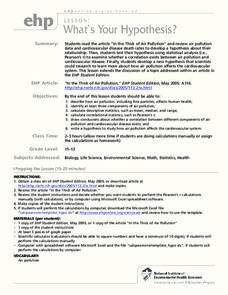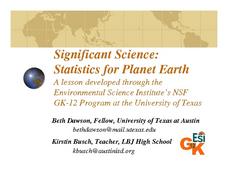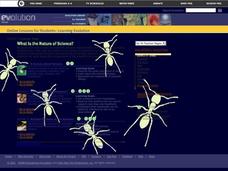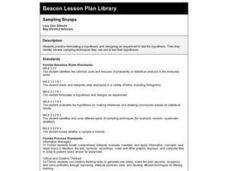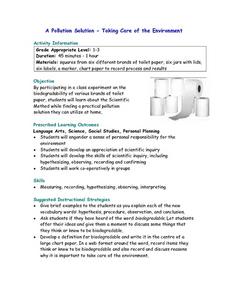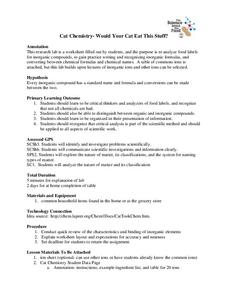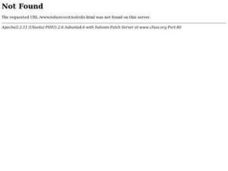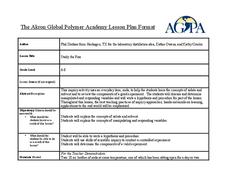Curated OER
Practice Writing Titles and Hypotheses
In this hypothesis and title writing worksheet, learners are given five experimental questions and they are to write an appropriate title and hypothesis for each question.
Curated OER
Practice Writing and Evaluating Conclusion Paragraphs
In this writing conclusions worksheet, learners practice writing and evaluating paragraphs written at the end of an experiment. They are given a hypothesis and a results sentence and they write a conclusion.
NOAA
Understanding El Niño Using Data in the Classroom
Are weather troubles caused by El Nino? An installment of a larger series presents a five-part lesson on El Nino. First, scholars learn to read sea surface temperature maps. Then, they compare them to data on graphs before determining if...
Curated OER
Experimental Design Practice
In this experimental design worksheet, students are given two experimental scenarios to read. They answer questions about each including finding the hypothesis, the independent and dependent variables and controls. They design a graph...
College Board
2013 AP® Biology Free-Response Questions
AP® free-response questions are often challenging for scholars. Give them practice writing free-response questions using former questions from the AP® Biology exam on topics such as genetic mutations, cellular respiration, evolution, and...
Curated OER
An Introduction to Microbes and Microbes Are Everywhere
Seventh graders define the term microbe. They identify the five main groups of microbes. Students give examples of ways in which microbes have impacted or currently impact human life. They create a hypotheses for where they expect to...
Edgemont Elementary School
Scientific Method Unit
Four out of five teenagers experiment with science by accident. This unit teaches the five parts of the scientific method through examples, guided practice, independent practice, and then through a hands-on experiment. Each step is...
Purdue University
The Case of the Pilfered Pin: A Measurement Inquiry Activity
Who pilfered the pin? Scholars practice measurement skills as they solve the mystery of a stolen pin. They measure length, temperature, and mass and determine which of select suspects committed the crime. During the STEM hands-on...
Curated OER
What's Your Hypothesis?
Find the article, "In the Thick of Air Pollution," not through the resource link in the lesson, but through an Internet search. Have high schoolers read it and perform calculations with the statistics provided. The objective is to...
Curated OER
8th Grade Earth Science: Density
Learners draw upon their prior knowledge of the density of water and practice writing a hypothesis, making an observation, and analyzing data while watching a density demonstration.
Curated OER
Significant Science: Statistics for Planet Earth
Ninth graders discover how statistics are used to interpret results of scientific experiments. Students write hypotheses and test the hypotheses by collecting data and organizing the data. Students graph their data to produce a visual....
Environmental Protection Agency (EPA)
How Much Water Do You Use?
Incorporate reading strategies, math, research, and the scientific method into one lesson about water conservation. After reading a story about a landlady trying to determine how many people are living in an apartment, learners develop a...
Curated OER
What is the Nature of Science?
Learners examine videos of field researach to discover the components of the scientific process. Using forms, they conduct community surveys about the nature of science. They research the extinction of dinosaurs and compare...
West Contra Costa Unified School District
Scientific Method Mania
Horrible science puns only happen periodically, but the scientific method is forever. Young scientists observe two presentations on the scientific method, complete independent practice worksheets, and integrate their knowledge through a...
Curated OER
Sampling Snoops
Students practice formulating a hypothesis and designing an experiment to test the hypothesis. They identify several sampling techniques they can use to test their hypotheses.
Curated OER
Floating Soap
Students explore the density of soap. In this science lesson, students conduct an experiment to find which types of soap will float. Students make a hypothesis and record their observations.
Curated OER
A Pollution Solution- Taking Care of the Environment
Students examine the biodegradability of different brands of toilet paper in a hands-on activity. Through this activity they also discover the steps of the Scientific Method and use new terms such as hypothesis, procedure, observation,...
Curated OER
Chemistry First Marking Period Review
For this chemistry review worksheet, students review terms and concepts covered. Students practice metric conversions, factor labeling, temperature conversions, heat calculations, atomic structure, and gas laws. This worksheet has 3...
Curated OER
Biology Project: Gone Fishing
Students write a scientific article using data and prediction skills. In this scientific writing lesson, students access data about fishing off the coast of New Jersey. They look at satellite data, fluorometry and CTD data over a 3 -4...
Curated OER
Scientific Method in Action
High schoolers investigate the current environmental movement by cleaning up their own campus. In this environmental care lesson, students practice cleaning their "environment" by picking up trash on their campus and decrease litter by...
University of Georgia
Would Your Cat Eat This Stuff?
Processed foods use inorganic compounds for flavoring and preservation. This take-home laboratory challenges scholars to find 20 different compounds identified on the labels of foods to list on their data collection sheet. The activity...
Curated OER
Solid Waste and Recycling
Students demonstrate effects of waste on environment and ways of reducing it, observe how much packaging goes into bag lunches each day, and survey their families to assess awareness levels and household recycling practices. Lessons all...
Curated OER
Study the Fizz
Middle schoolers experiment to determine which bottle of soda has more dissolved carbon dioxide. In this solutions lesson, students use the scientific method to test the amount of carbon dioxide in bottles of soda. They identify and...
Serendip
Carbohydrate Consumption, Athletic Performance and Health – Using Science Process Skills to Understand the Evidence
Should athletes carb load before an event or consume carbohydrates during the competition? Scholars discuss how to set up a hypothesis and experiment to answer a question relating carbohydrates and athletic performance. Then, they read...










